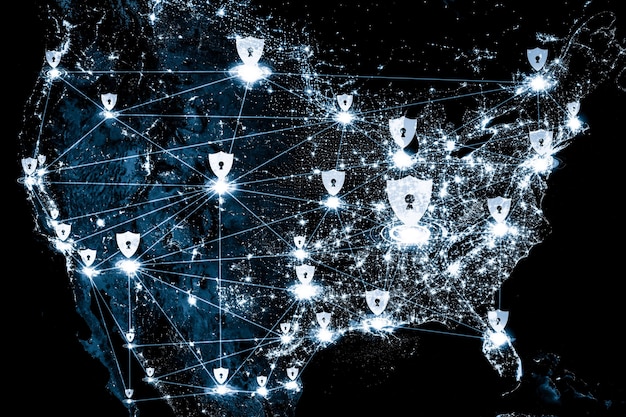New US Data Privacy Laws: What Online Communities Must Know

Navigating the evolving landscape of Recent Updates: New Data Privacy Laws Affecting Online Communities in the US – What You Need to Know is crucial for ensuring compliance, fostering trust, and protecting user information amidst stringent legislative changes impacting how online platforms manage sensitive personal data.
In an increasingly interconnected digital world, online communities serve as vital hubs for connection, information exchange, and shared interests. However, this growth also brings heightened scrutiny regarding user data. Understanding the Recent Updates: New Data Privacy Laws Affecting Online Communities in the US – What You Need to Know is not merely a legal obligation but a cornerstone of user trust and platform sustainability. These legislative shifts are reshaping how personal data is collected, processed, and secured, directly impacting community administrators and members alike. Compliance is key.
Understanding the Evolving Landscape of US Data Privacy
The United States has long grappled with a fragmented approach to data privacy, distinct from the more unified frameworks seen in other global regions. This landscape, however, is rapidly shifting, driven by a growing awareness of data breaches, increasing consumer demand for privacy control, and the sheer volume of personal data collected online. For online communities, these changes present both challenges and opportunities.
Over the past few years, we’ve witnessed a significant acceleration in state-level legislative efforts, recognizing that a federal data privacy law, while continually discussed, remains elusive. This state-by-state approach means that online communities, regardless of their physical location, must contend with a patchwork of regulations that can vary significantly in scope, applicability, and enforcement. The complexity of these laws necessitates a proactive and adaptable strategy from platforms and their administrators.
Key Drivers Behind Recent Privacy Legislation
Several factors have fueled the recent surge in data privacy laws across various US states. A prominent driver is undoubtedly the increasing frequency and severity of data breaches, which have exposed millions of individuals’ sensitive information, eroding trust in online platforms. Consumers are also becoming more aware of the value of their personal data and are demanding greater transparency and control over how it is used.
- Consumer Demand: A significant push from individuals seeking more control over their personal information online.
- High-Profile Data Breaches: Numerous incidents have highlighted vulnerabilities in data security, prompting legislative action.
- Technological Advancements: The rapid evolution of data collection and processing technologies necessitates updated legal frameworks.
- Global Influence: International privacy standards, such as GDPR, have influenced US states to adopt similar robust protections.
Beyond these immediate concerns, a broader philosophical shift is underway, moving towards a recognition that privacy rights are fundamental in the digital age. This underpins many of the new laws, which often grant consumers stronger rights regarding access, deletion, and opt-out of the sale of their data. For online communities, which thrive on user-generated content and interaction, this means a deeper consideration of what data is collected, why, and how it is protected.
Moreover, the distinct characteristics of online communities – frequently involving the sharing of personal opinions, health information, or financial details in niche forums – make them particularly susceptible to privacy risks. These laws aim to mitigate such risks, demanding greater accountability from platforms. Understanding this foundational context is essential before delving into the specifics of recent legislative updates.
The fragmented nature of US privacy law also means that communities operating nationally or even internationally must carefully assess their user base to determine which specific state laws apply. This can be a complex undertaking, often requiring legal expertise to navigate. The increasing enforcement actions indicate that regulators are serious about compliance, underscoring the need for diligence.
Major State-Level Privacy Laws Impacting Online Communities
While a comprehensive federal data privacy law remains a topic of debate, individual US states have taken significant strides to fill this regulatory void. The California Consumer Privacy Act (CCPA) and its successor, the California Privacy Rights Act (CPRA), set a precedent, inspiring similar legislation across the nation. Understanding the provisions of these pioneering laws, alongside those enacted by other states, is critical for any online community serving users in the US.
The landscape includes not only California but also states like Virginia, Colorado, Utah, and Connecticut, each with their own nuanced interpretations and requirements. These laws, while sharing common principles, often differ in their definitions, exemptions, and compliance deadlines, creating a complex web for online communities to untangle. Non-compliance can lead to substantial fines and reputational damage.
The California Precedent: CCPA and CPRA
The **California Consumer Privacy Act (CCPA)**, effective January 1, 2020, was a landmark piece of legislation. It granted California consumers significant rights regarding their personal information, including the right to know what data is collected about them, the right to delete personal information, and the right to opt-out of the sale of their personal information. For online communities, this meant re-evaluating data collection practices and implementing mechanisms for users to exercise these rights.
The **California Privacy Rights Act (CPRA)**, which came into full effect on January 1, 2023, and became fully enforceable on July 1, 2023, enhanced and expanded the CCPA. The CPRA introduced the concept of “sensitive personal information” (such as health data, precise geolocation, racial or ethnic origin), granting consumers the right to limit its use and disclosure. It also established the California Privacy Protection Agency (CPPA) to enforce these laws, marking a significant step towards dedicated regulatory oversight.
- Expanded Consumer Rights: New rights include limiting the use of sensitive personal information and correction of inaccurate data.
- Dedicated Enforcement Agency: The CPPA streamlines enforcement and provides regulatory clarity.
- Increased Compliance Burden: Platforms must conduct regular data protection assessments for high-risk processing activities.
- Employee & B2B Data Inclusion: CPRA extended its applicability to employee and business-to-business data, closing prior exemptions.
For online communities, the CPRA particularly emphasizes the need for transparent privacy policies, clear consent mechanisms, and robust data security practices. If your community has California users and meets the specified revenue or data processing thresholds, full compliance is non-negotiable.
Virginia, Colorado, and Other State Laws
Following California’s lead, states like Virginia (Virginia Consumer Data Protection Act, VCDPA), Colorado (Colorado Privacy Act, CPA), Utah (Utah Consumer Privacy Act, UCPA), and Connecticut (Connecticut Data Privacy Act, CTDPA) have enacted their own comprehensive privacy laws. While similar to CCPA/CPRA in granting consumers rights over their data, each has unique characteristics:
The VCDPA, effective January 1, 2023, grants consumers rights related to access, deletion, and opt-out of targeted advertising and the sale of personal data. Notably, it includes a right to confirm whether a controller is processing their data. The CPA, also effective July 1, 2023, is broader in scope, covering entities that control or process the personal data of 25,000 or more Colorado consumers. It requires opt-in consent for sensitive data and emphasizes data protection assessments.

The UCPA, effective December 31, 2023, is considered more business-friendly, with fewer opt-out rights and no explicit right to correct data. It targets businesses meeting specific revenue and data processing thresholds. Lastly, the CTDPA, effective July 1, 2023, closely aligns with the VCDPA and CPA, providing similar consumer rights and enforcement mechanisms, including a 60-day cure period for violations.
While the specifics vary, the common thread among these laws is the increased focus on transparency, consumer control, and robust data security. Online communities must conduct thorough data mapping to understand what data they collect, from whom, and for what purpose, to ensure they can adequately respond to data subject requests and meet disclosure requirements across all applicable jurisdictions. This requires significant administrative and technical adjustments.
Impact on User Data and Community Management
The proliferation of new data privacy laws fundamentally alters how online communities handle user data and conduct their day-to-day operations. No longer can platforms merely collect data at will; they must now meticulously consider the “who, what, why, and how” of every piece of information. This shift directly impacts everything from user registration and content moderation to targeted advertising within the community space.
For community managers, this means a significant learning curve. It involves understanding legal jargon, implementing new technical safeguards, and communicating changes clearly to their user base. The goal is to move from a reactive stance on privacy to a proactive, privacy-by-design approach where data protection is baked into every aspect of the community’s infrastructure.
Rethinking Data Collection and Usage Practices
One of the most immediate impacts of these laws is the requirement to re-evaluate data collection and usage practices. Communities must move towards a principle of data minimization—collecting only the data that is genuinely necessary for the community’s function. This reduces liability and simplifies compliance. Beyond collection, there’s a heightened demand for transparency regarding how data is used.
- Data Minimization: Collect only essential data, reducing risk and simplifying compliance.
- Purpose Limitation: Clearly define and communicate why specific data is collected and used.
- Explicit Consent: Obtain clear, affirmative consent for data collection, especially for sensitive data.
- Data Retention Policies: Implement clear policies on how long data is stored and when it’s securely deleted.
Online communities must also be prepared to honor user requests related to their data. This includes providing access to personal information, allowing for correction or deletion, and enabling users to opt-out of specific data processing activities, such as targeted advertising. The infrastructure to facilitate these requests must be in place and easily accessible to users.
Furthermore, many laws require platforms to distinguish between simply providing a service and engaging in practices that constitute the “sale” of personal information (even if no money changes hands, but data is exchanged for other benefits). Community platforms must clearly define their stance on this to users and provide opt-out mechanisms if applicable.
Challenges for Small to Medium-Sized Communities
While large tech companies often have dedicated legal teams, small to medium-sized online communities, especially those run by volunteers or with limited resources, face significant challenges in achieving compliance. The cost of legal counsel, developing new technical features, and implementing robust privacy management systems can be prohibitive.
Moreover, the multi-state nature of US privacy laws means that a community with users across the country may need to comply with several different regulations simultaneously. This regulatory fragmentation can lead to confusion, increased administrative burden, and potential oversight if not managed carefully. The lack of federal uniformity significantly complicates matters for smaller entities.
However, ignoring these laws is not an option due to the potential for severe penalties and erosion of user trust. Smaller communities may need to prioritize compliance based on their primary user base or seek simplified solutions, such as leveraging privacy-focused platform features or consulting with privacy advisors specializing in smaller businesses. Education and awareness within the community administration team are paramount.
Ultimately, all online communities, regardless of size, must now view data privacy as a core operational concern, not merely a legal afterthought. Integrating privacy considerations into every aspect of community management will be crucial for long-term success and maintaining a trustworthy environment for users.
Key Compliance Measures for Online Communities
Navigating the complex maze of new data privacy laws requires a strategic and systematic approach for online communities. Compliance is not a one-time project but an ongoing commitment to protecting user data and respecting individual privacy rights. Implementing robust measures across various facets of community operations is essential to mitigate legal risks and build a stronger, more trusting relationship with your members.
These measures span from foundational legal documentation to technical safeguards and continuous training. The goal is to create a comprehensive privacy program that is both effective and adaptable to future legislative changes. Ignoring these steps can lead to significant penalties and irreversible damage to a community’s reputation.
Updating Privacy Policies and Terms of Service
The cornerstone of compliance for any online community is transparent and comprehensible legal documentation. Your Privacy Policy and Terms of Service must be meticulously updated to reflect the requirements of all applicable state privacy laws. This includes clear explanations of:
- Data Categories Collected: What types of personal information are gathered from users?
- Purpose of Collection: Why is this data being collected, and how will it be used?
- Data Sharing Practices: Are any user data shared with third parties, and under what circumstances?
- User Rights and Mechanisms: How can users exercise their rights (access, deletion, opt-out)? Include clear instructions.

Beyond legal accuracy, these documents should be written in plain, accessible language, avoiding excessive jargon. Users should be able to quickly understand their rights and how their data is handled. Consider multi-layered privacy notices, such as concise summaries, followed by more detailed explanations. Regular reviews and updates of these policies are crucial as laws evolve.
Community administrators should also ensure that users are prompted to review and accept updated policies, especially when significant changes related to data processing occur. This often involves clear banners, pop-ups, or email notifications upon logging in.
Implementing Data Subject Request Mechanisms
One of the core tenets of modern privacy laws is granting individuals greater control over their data, including the right to access, correct, delete, or opt-out of the sale of their personal information. Online communities must establish clear, efficient, and verifiable mechanisms for users to submit and fulfill these “Data Subject Requests” (DSRs).
This typically involves creating a designated privacy dashboard within the user’s account settings or a dedicated contact form. The process should be streamlined, allowing users to make requests without excessive hurdles. Once a request is received, the community must have internal procedures to verify the user’s identity and fulfill the request within the legally mandated timeframe (e.g., 45 days under CCPA/CPRA, with possible extensions).
For deletion requests, it’s vital to ensure that data is not only removed from active databases but also from backups and third-party systems where it might have been shared (e.g., analytics providers). This often requires strong agreements with third-party vendors regarding their data handling practices. Documentation of all DSRs and their fulfillment is also a critical compliance requirement, demonstrating accountability.
Building Trust: Communication and Transparency
In the digital realm, trust is currencies. For online communities, where personal connection is paramount, building and maintaining user trust is non-negotiable. The changing landscape of data privacy offers a unique opportunity to reinforce this trust through transparent communication and a genuine commitment to user privacy. Beyond merely fulfilling legal requirements, a proactive approach to transparency can foster a more engaged and loyal community.
Users who feel their data is respected and protected are more likely to participate, contribute, and recommend a community to others. Conversely, perceived mishandling of data can lead to rapid exodus and severe reputational damage. Therefore, community leaders must prioritize clear, continuous, and empathetic communication regarding privacy practices.
Clear Communication of Privacy Practices
It’s one thing to have a legally compliant privacy policy; it’s another to make sure your users actually understand it. Communities should proactively educate their members about their data privacy rights and how the platform protects their information. This goes beyond just posting a link to a policy in the footer.
- Plain Language Summaries: Provide executive summaries of your privacy policy in easy-to-understand terms.
- In-Platform Notifications: Use banners, pop-ups, and notifications to highlight key privacy changes or features.
- Educational Content: Publish blog posts, FAQs, or even short videos explaining data privacy in an accessible way.
- Dedicated Privacy Hub: Create a central section within the community where all privacy-related information is easily found.
When changes to privacy policies are made, specifically explain what has changed and why, rather than just announcing an update. Transparency about data breaches, if they occur, is also essential. While difficult, immediate and honest communication, along with steps being taken to mitigate harm, can help retain user trust.
Furthermore, consider how privacy settings are presented within the community. Are they intuitive? Easily discoverable? Can users easily control who sees their profile, their posts, or their activity? The level of granular control offered to users over their privacy within the community fosters a sense of security and autonomy.
Fostering a Culture of Privacy within the Community
Beyond formal policies, community administrators and moderators have a crucial role in fostering a culture of privacy. This involves leading by example and encouraging responsible data sharing among members. It also means actively moderating content that might compromise privacy or encourage inappropriate data sharing.
For instance, if members discuss highly sensitive personal information, moderators can gently remind them of privacy implications or suggest moving such conversations to private channels. Educating users about “phishing” attempts or requests for personal information that might occur within the community is also vital. This proactive moderation strengthens the overall privacy posture of the community.
The community’s stance on privacy should be consistent across all touchpoints, from onboarding new members to conflict resolution. When members perceive that their privacy is genuinely valued by the platform and its stewards, they are more likely to engage authentically and build stronger connections, knowing their digital sanctuary is safeguarded.
Ultimately, regulatory compliance is a baseline; true success in navigating new data privacy laws lies in transforming legal obligations into opportunities to deepen user trust and cultivate a thriving, secure, and privacy-aware online environment. This commitment benefits everyone involved, from platform owners to individual users.
Future Outlook: Predictive Compliance and Evolution
The legislative momentum around data privacy in the US shows no signs of slowing down. While significant progress has been made at the state level, the pressure for a comprehensive federal privacy law continues to mount. This evolving landscape means that online communities cannot afford to rest on their laurels; static compliance strategies will quickly become obsolete. Instead, a dynamic, “predictive” approach to compliance will be necessary to stay ahead of the curve.
This involves not only reacting to new laws but also anticipating future trends, investing in adaptable technologies, and maintaining a keen awareness of emerging privacy risks. The goal is to build resilience into the community’s operations, ensuring it can withstand the shocks of future regulatory changes and technological advancements.
The Path Towards a Federal Privacy Law
The absence of a single, overarching federal data privacy law continues to be a point of contention and complexity for businesses operating across state lines, including online communities. Various proposals for a federal law have been introduced in Congress, often attempting to reconcile the diverse perspectives of consumer advocates, tech companies, and different political factions.
A federal law, if enacted, could potentially streamline compliance for online communities by superseding the patchwork of state laws. However, the details of any such law would be crucial. Would it be a strong, comprehensive law like GDPR, or a more limited framework? What would its enforcement mechanisms look like? These questions remain open, but the conversation is ongoing.
For online communities, preparing for a potential federal law means building robust data governance frameworks that can adapt to different requirements. Focusing on universal privacy principles—transparency, user control, data minimization, and strong security—will serve as the best preparation, regardless of what form a federal law ultimately takes. It’s about establishing best practices now, rather than waiting for mandates.
Emerging Privacy Challenges and Technologies
Beyond legislative changes, online communities must also grapple with emerging privacy challenges driven by new technologies. The rise of artificial intelligence (AI), particularly generative AI, presents novel questions about data input, output, and the potential for privacy breaches. How will data used to train AI models in a community context be governed? Who owns the data created by AI within a community?
Furthermore, the increasing sophistication of data analytics, the growth of immersive virtual environments (the “metaverse”), and advancements in biometric identification all present new frontiers for privacy regulation. Online communities operating in these spaces will need to carefully consider the privacy implications and ensure their practices align with evolving societal expectations and legal frameworks.
For example, communities leveraging AI for content moderation or personalization must ensure these tools are deployed ethically and transparently, respecting user privacy. This requires not just legal compliance but ethical considerations. Investing in privacy-preserving technologies, such as federated learning or homomorphic encryption, could become increasingly important for communities looking to innovate responsibly.
Staying informed about these technological shifts, engaging with privacy experts, and fostering an agile approach to data governance will be paramount for online communities. The future of data privacy is not just about legislative compliance, but about proactively shaping a secure and trustworthy digital environment for all users in an ever-evolving technological landscape.
| Key Aspect | Brief Description |
|---|---|
| 📊 State-Level Laws | US privacy legislation is fragmented, with prominent laws like CPRA (California) leading the way, followed by Virginia, Colorado, Utah, and Connecticut. |
| 🛡️ User Rights & Control | New laws grant users rights to access, delete, correct, and opt-out of data sale or sharing for targeted ads. |
| ✅ Compliance Needs | Communities must update privacy policies, implement data subject request mechanisms, and practice data minimization. |
| 💡 Building Trust | Transparent communication and fostering a privacy-aware culture are crucial for user engagement and loyalty. |
Frequently Asked Questions About Data Privacy Laws
▼
The CPRA is an expansion of the CCPA, strengthening consumer rights and establishing the California Privacy Protection Agency (CPPA) for dedicated enforcement. It introduced new concepts like sensitive personal information and required data protection assessments, making California’s privacy laws even more robust and comprehensive.
▼
Applicability varies by law and often depends on factors like annual revenue, the number of consumers whose data is processed, or the percentage of revenue derived from data sales. While large entities are usually targeted, even smaller communities might be affected if they meet specific thresholds or have users in states with broader definitions of “business.”
▼
Data minimization is the principle of collecting only the precise amount of personal data that is necessary for a specific purpose. It’s crucial because it reduces the risk of data breaches, simplifies compliance efforts, and aligns with user expectations for privacy, ultimately fostering greater trust within the community.
▼
Effective data deletion requires clear processes for verifying user identity, removing data from active systems, and ensuring it’s purged from backups and third-party services. Communities should implement robust, documented procedures to track and fulfill these “right to delete” requests within the legally stipulated timeframes, ensuring full compliance.
▼
While discussions are ongoing and various bills have been proposed, a comprehensive federal privacy law has not yet been enacted. The US continues with a fragmented, state-by-state approach. However, the increasing number of state laws might accelerate the push for federal legislation to create a more consistent regulatory environment.
Conclusion
The landscape of data privacy laws in the US is undeniably complex, with a continuing shift towards greater consumer control and stricter corporate accountability. For online communities, this evolution is not merely a legal hurdle but a fundamental reshaping of how they collect, manage, and protect user data. Embracing these **Recent Updates: New Data Privacy Laws Affecting Online Communities in the US – What You Need to Know** is crucial for maintaining trust, ensuring long-term sustainability, and fostering a secure environment where users feel respected. By prioritizing transparency, implementing robust compliance measures, and staying vigilant to future legislative and technological developments, online communities can navigate this intricate environment successfully and continue to thrive as valuable digital spaces.





